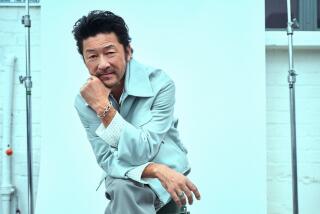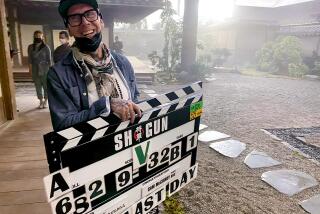Trade Expert and Japan Industry Analyst Share Similar Mission : Pacific Rim: They help Americans understand and confront the challenge posed by their greatest economic partner and rival. But one is regarded as a sympathizer of the Asian nation and the other as a critic.
- Share via
FREMONT, Calif. — Japan specialists Glen Fukushima and Sheridan Tatsuno have led lives of striking symmetry: They were born 40 years ago. They grew up in California, just an hour’s drive apart. Both are super-achievers afloat in Ivy League degrees. Both dropped planned careers in the sciences and plunged instead into the raucous squabble between America and Japan.
And now both Fukushima, until recently a U.S. trade negotiator, and Tatsuno, an analyst of Japanese industry, share a similar mission: to help Americans understand and confront the challenge posed by their greatest economic partner and rival.
But in one key respect the two Americans, both of Japanese descent, differ. Tatsuno is regarded as a sympathizer of Japan, and Fukushima as a critic. Together, the two friends represent the “yin and the yang,” or the soft and hard sides, of American attitudes toward Japan.
“Japanese journalists would like to characterize us as ‘good guy, bad guy,’ ” Tatsuno said over dinner recently with Fukushima and other friends. “I like to describe us as ‘good guy, tough guy.’ ”
Tatsuno, gregarious and given to colorful speech, is a leading analyst of Japanese technology. He is best known for his former work with Dataquest, a market research firm in the Silicon Valley. He openly admires Japanese industrial and technological prowess, and is deeply frustrated by the continued indifference of many U.S. firms to his warnings about Japan’s competitive threat.
“In a sense, I feel like I’m Paul Revere,” Tatsuno said. “I’m a guy sitting in a little tower looking out and saying: ‘They’re coming, here’s how fast they’re coming, and do something about it.’ And they say, ‘Nah, I’ll go back to sleep.’
“Frankly,” Tatsuno added, “I don’t feel very sorry for these companies. They were warned, but they wouldn’t listen because they were too arrogant.”
Fukushima is more measured, shaking his head and chuckling at his friend’s analogy of U.S. criticism toward Japan as “wife beating.” For the past four years, Fukushima has fought to open Japan’s markets on behalf of the Office of the U.S. Trade Representative, first as director of Japanese affairs and then, until he resigned last month, as deputy assistant U.S. trade representative for Japan and China.
“I agree that quite a few companies haven’t made enough efforts in Japan, but I also know a number of companies that have done everything right and still can’t get in,” Fukushima said. “Although there are few formal barriers, there are still informal barriers. I’ve been exposed to a lot more of the negative stories, so I tend to be more skeptical.”
Fukushima recalled one American company that required a year’s time and help from the U.S. and Japanese governments just to place an ad in a Japanese trade journal after Japanese competitors had pressured the publication to reject it.
Tatsuno has his horror stories, too. In the early 1980s, he said, a U.S. semiconductor maker, Mostek Corp., cockily refused to heed Dataquest’s warnings to diversify as a hedge against growing Japanese competition. Within two years, “they ran into a brick wall at 100 miles per hour, and it was bloody,” he said. “They went out of business and laid off 5,000 people.”
Fukushima and Tatsuno also disagree on how much Japanese firms in America will embrace equal opportunity laws. Tatsuno argues that an onslaught of discrimination lawsuits will force Japanese companies, out of sheer pragmatism, to place more American males, women and minorities in key jobs. Fukushima, however, believes that the Japanese may install a few token executives while retaining real authority.
The divergent views of the two men have been shaped by the jobs they have held and the people that they encounter.
As a U.S. trade official, Fukushima was charged with representing American interests. He estimated that 80% of his information on U.S.-Japan trade matters came from Americans, many of them aggrieved. And most of his time in Japan--44 trips in four years--he spent negotiating against steely bureaucrats with special interests and turfs to protect.
Fukushima’s track record shows agreements to open Japan’s legal system to foreign attorneys and to pry open markets for supercomputers, construction and forest products. He also helped gain greater access for foreign cigarettes, citrus, beef and semiconductors.
Exciting as it was, the acrimonious environment didn’t exactly make for an endearing experience--even for a 20-year student of Japan. “If I’d joined the USTR before I’d been to Japan and made friends in the press and academia, I’d probably have a very jaundiced view of Japan,” Fukushima said.
“Some Americans only deal with Japanese negotiators and think the Japanese lie, cheat, are duplicitous and stab you in the back. One said to me: ‘I’d prefer dealing with the Soviets; at least the Soviets don’t lie to you.’ ”
As a Japanese-American, Fukushima took special pains to establish which side he stood on. Even though fluent in Japanese, he made it a point to use English in Japan most of the time.
Despite his efforts, some Japanese were still confused by his heritage. Waitresses would assume that he was Japanese and serve him after lower-ranking members of the U.S. delegation. Initially, he was also excluded from some official dinner invitations. His presence seemed “inconvenient” because here, finally, was an American who understood everything the Japanese said to one another in front of their Yankee guests.
Eventually, Fukushima’s intellectual acuity, vast knowledge of Japan and prodigious energy--in Tokyo he would catch four hours of sleep a night between endless rounds of meetings--won him respect from both sides. U.S. News and World Report described him as America’s “single most effective trade negotiator” with Japan. And in the now-infamous book, “The Japan That Can Say No,” right-wing politician Shintaro Ishihara--no friend of Fukushima--called him “one of the most capable Asian specialists” in the United States.
Yet Fukushima’s hard work on behalf of corporate America is not universally appreciated now that he is in the job market. He refuses to work for a Japanese firm to avoid ethical questions raised by the more than 110 former government officials who have switched sides. Although he has received offers from some law firms, other companies have expressed concern that hiring someone from the USTR could jeopardize business relations with the Japanese. As Tatsuno put it: “American companies talk tough in D.C., but back in Tokyo they talk about flexibility because they don’t want to antagonize a potential business client.”
Tatsuno understands that delicate dance because he has to perform it, too. With business clients in Japan, Europe and America, he can’t afford to alienate anyone.
“If you want to sell to Japan, you don’t bash them on the head,” said Tatsuno, who left Dataquest last year to start NeoConcepts, his own consulting firm. “You basically stroke and cultivate the relationship and build trust.”
While at Dataquest, Tatsuno was a consultant for all of the major Japanese electronics firms. When he visited them in Japan, they rolled out the red carpet, confided in him, sought his advice and showed him their business plans.
In Japan, Tatsuno speaks the language of his customers. He believes, more than Fukushima, that his Japanese heritage has helped his effectiveness by easing racial and cultural barriers. Occasionally, however, he encounters condescension for being imin na kodomo --a child of immigrants.
Tatsuno’s insight into Japanese industry helped him predict the collapse of the U.S. memory chip industry more than two years before it happened. He has also written two books that give Americans a glimpse of Japan’s technological wizardry, “The Technopolis Strategy” and, more recently, “Created in Japan: From Imitators to World-Class Innovators.”
In both books, Tatsuno warns America to wake up to Japanese advances. “I’d rather help people when they’re still healthy so they don’t need the emergency ward,” he said.
In other areas, the two friends are more similar than different. For example, neither man cultivated an early interest in Japan.
Although Fukushima was born on a U.S. Army base in Japan, he grew up as a California kid--getting a car at 16, going to Iron Butterfly concerts and moving from Monterey to San Francisco to Los Angeles. Tatsuno grew up in San Jose, became a springboard diver, went to Latino parties and learned better Spanish than Japanese.
In 1967, Fukushima went to Stanford; Tatsuno chose Yale. Fukushima wanted to be a doctor; Tatsuno, a marine biologist. But the Vietnam War was igniting student passions, and both decided that there were more important things in life than chemistry and biology.
Today, their resumes are crowded.
For Fukushima: A year studying and milking cows at a college of 20 students in the California desert; a Stanford degree in economics; a Harvard law degree, a master’s in East Asian studies, doctoral work in sociology; a teaching fellow for noted Japan scholars Ezra Vogel and Edwin Reischauer; five years in Japan as a Fulbright scholar, copy editor, law clerk and businessman; a corporate lawyer in Los Angeles.
For Tatsuno: A Yale degree in urban studies-political science; a year in Venezuela teaching English and digging sewers; a master’s degree from Occidental, a second from Harvard; an internship in public affairs from the Coro Foundation; a stint at environmental consulting; two years at Bechtel; two years in Japan teaching English.
Both married women from Japan, and Tatsuno has a daughter. Both fear that the U.S.-Japan relationship will continue to deteriorate, and both are appalled at America’s general ignorance about Japan--in government as well as business.
Fukushima, for instance, estimated that the Japanese commit up to 10 times more people, money and time to U.S.-Japan trade negotiations than do the Americans. In one negotiation, he recalled, five American officials confronted 54 Japanese.
Moreover, Fukushima was the USTR’s only official who could read and speak flawless Japanese for negotiating purposes. Now, Japanese and U.S. sources maintain, no one can. On his arrival, the USTR office in Japan did not subscribe to a single Japanese-language publication. When Fukushima tried to subscribe to the Japan Economic Journal, the White House budget office rejected his request. (The office eventually got a free subscription, which helped Fukushima see at first hand the way in which the Japanese press consistently skewed the U.S. position.)
“The USTR desperately needs technical expertise on Japan, meaning above all the ability to read Japanese accurately, and I have no evidence anyone there has it after Fukushima,” said Chalmers Johnson, a noted Japan scholar at the University of California at San Diego.
U.S. Trade Representative Carla A. Hills disagreed with the criticism, however. She said she is satisfied with the office’s level of competence.
For his part, Tatsuno said he finds American business people unprepared, even arrogant--particularly in areas such as software, where the Japanese have not yet made a mark. “Part of the problem now is that there is such a negative image of Japan that you overlook their strengths,” he said.
“They are investing huge amounts of money, moving upscale, thinking long term. If we continue to believe they’re falling off the cliff,” Tatsuno warned, “we shouldn’t be surprised if they pass us up in three to four years.”
More to Read
Inside the business of entertainment
The Wide Shot brings you news, analysis and insights on everything from streaming wars to production — and what it all means for the future.
You may occasionally receive promotional content from the Los Angeles Times.











